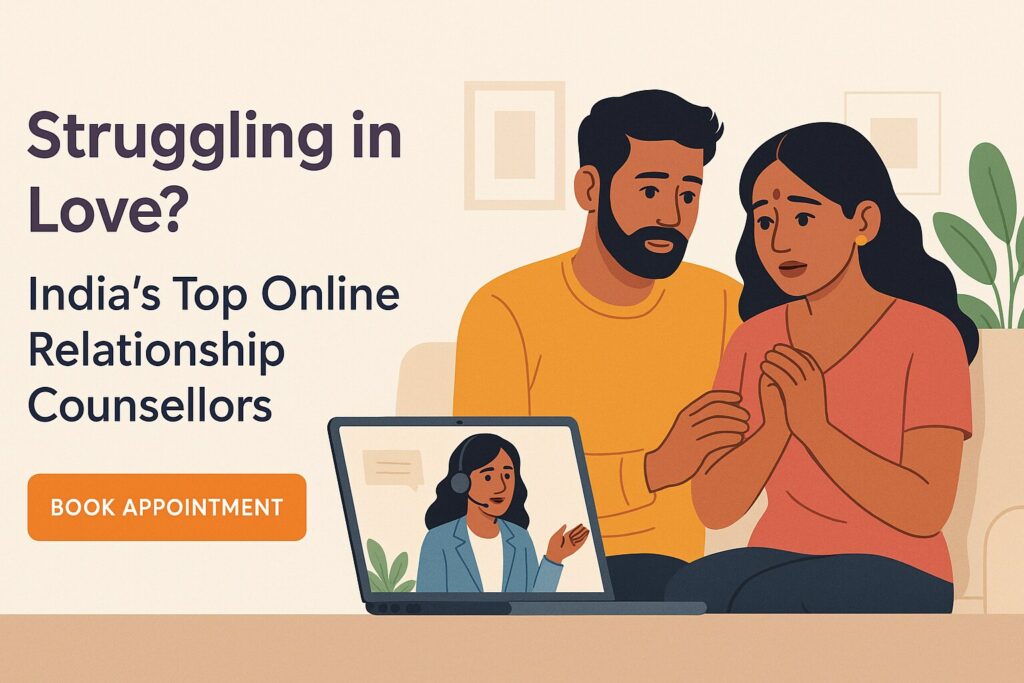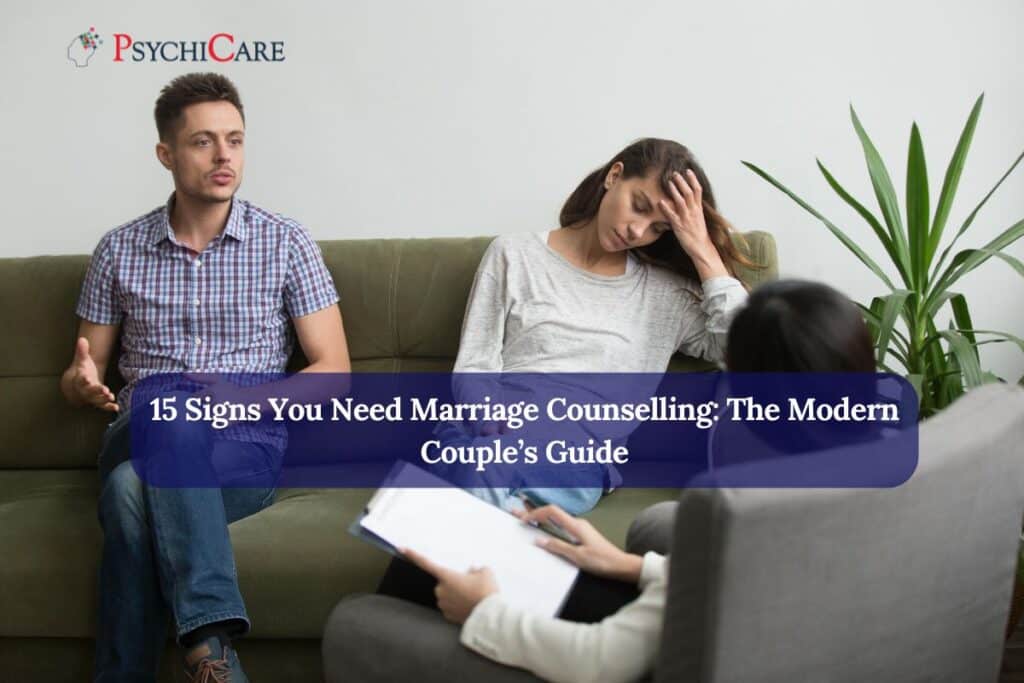Relationships in India can be challenging – arguments about in-laws, stress of arranged marriages, doubts before commitment, or even the pain of betrayal. At PsychiCare, our online relationship counselling connects you with licensed counsellors who understand these cultural realities and help you find calm, clarity, and stronger connections.
With online sessions, you and your partner can talk to a professional from the privacy of your home, without the pressure of visiting a clinic. Whether it’s a breakup, infidelity, divorce, or just feeling distant in your marriage, PsychiCare counsellors are here to guide you step by step.
Book Your Online Relationship Counselling Session
Get 1-to-1 support from an RCI licensed, certified psychologist via Video, Chat, or WhatsApp. Each session is 60 minutes and priced at ₹3,000.
Trusted by couples across India with a 95% success rate in improving communication, rebuilding trust, and strengthening relationships.
Book AppointmentWhat Is Relationship Counselling?
Relationship counselling is a type of professional support where a counsellor helps individuals or couples resolve conflicts, improve communication, and rebuild trust. Unlike advice from friends or family, counselling is neutral, confidential, and focused on solutions.
In India, more couples are choosing online counselling because it fits into busy schedules, avoids social stigma, and provides access to experts even outside metro cities.
When Should You Consider Relationship Counselling?
Many couples wait until problems become unbearable before seeking help. But counselling can make a big difference even if issues seem “small.” Here are some common situations where Indian couples turn to a counsellor:
Frequent fights about family or in-laws
In joint families, it’s common for one partner to feel the other always sides with their parents. Small disagreements can quickly turn into daily battles.Stress before marriage
In both arranged and love marriages, doubts can creep in “Will we adjust?” “What if we are not compatible?” Counselling helps clear confusion and reduce anxiety before tying the knot.Infidelity or broken trust
Discovering an affair or secret can shatter a relationship. Counsellors guide couples through this painful stage and help them decide whether to rebuild or part ways respectfully.Lack of intimacy and connection
Many couples say they live together but feel emotionally or physically distant. Counselling helps partners reconnect and restore closeness.Thinking about divorce or separation
Ending a marriage is never easy, especially when children are involved. Counsellors provide a safe space to discuss options calmly and plan the future without bitterness.Parenting conflicts
Disagreements over raising children, discipline, or education often cause hidden stress. Counselling helps parents present a united front.
👉 If you see yourself in any of these situations, relationship counselling can guide you toward clarity, peace, and healthier bonds.

Issues We Help With at PsychiCare
Every relationship is unique, but certain problems come up again and again in Indian couples. Our counsellors are trained to handle these situations with care and practical solutions.
Breakups and Heartbreak
Separation can leave you feeling lost and drained. Counselling helps you process emotions, rebuild confidence, and prepare for a healthier future.
Cheating & Infidelity
Infidelity shakes the foundation of trust. Our counsellors guide couples through honest discussions, healing, and decisions about whether to repair or end the relationship.
Marriage & Couples Counselling
Arguments, silence, or constant misunderstandings, these are signs your marriage needs attention. We help partners talk openly, manage conflicts, and rediscover emotional closeness.
Divorce Support
Divorce is painful, especially when families or children are involved. Counselling provides emotional support, helps with co-parenting plans, and guides you toward a calmer new chapter.
Dating & New Relationships
Modern dating can feel confusing, especially with online platforms and cultural expectations. Counselling helps you understand patterns, improve communication, and build healthier connections.
Family Conflicts
In Indian households, pressure from in-laws, joint family living, or parenting disagreements often cause tension. Our counsellors help set boundaries while maintaining respect.
Intimacy Issues
Lack of physical or emotional intimacy can make partners feel like strangers. Counsellors work on rebuilding closeness step by step.
How Online Relationship Counselling Works
Starting counselling with PsychiCare is simple and comfortable. You don’t need to travel or sit in a waiting room; everything happens online, privately.
Step 1: Book Your Session
Choose your slot through our online booking page. Each session is 60 minutes and costs ₹3,000.
Step 2: Choose Your Mode
Sessions are available via Video, Chat, or WhatsApp, whichever makes you most comfortable.
Step 3: Join from Anywhere
You and your partner can join from the same place or even different cities. All you need is a phone or laptop with internet.
Step 4: Talk to a Licensed Psychologist
Our RCI certified counsellors create a safe space for you to share freely, understand each other better, and work on practical solutions.
Step 5: See the Change
With consistent sessions, couples experience better communication, reduced fights, and stronger emotional connection.
👉 Ready to begin? Book your appointment now and take the first step toward healing your relationship.
Therapies Used to Help With Relationship Issues in Counseling
Relationship counselling isn’t just about having conversations. Counsellors use well-researched therapies that guide couples toward healthier ways of connecting, resolving conflicts, and rebuilding trust. Some of the most effective include:
Cognitive Behavioural Therapy (CBT): Helps partners spot unhelpful thought patterns and replace them with healthier responses during disagreements.
Emotionally Focused Therapy (EFT): Strengthens the emotional bond between partners by uncovering deeper needs and feelings.
Gottman Method Couples Therapy: Based on decades of research, this approach improves communication, reduces conflict, and builds lasting intimacy.
Solution-Focused Therapy: A short-term, practical method that encourages couples to focus on immediate solutions instead of dwelling only on problems.
Family Systems Therapy: Looks at how family roles, generational patterns, or in-law dynamics affect the couple’s relationship.
Psychodynamic Therapy: Explores how past experiences and attachment styles influence current behaviour and relationship struggles.
Narrative Therapy: Encourages couples to “re-write” the story of their relationship, separating problems from personal identity.
Imago Relationship Therapy: Helps partners understand how childhood wounds show up in adult conflicts and teaches new ways to connect with empathy.
Mindfulness-Based Therapy: Brings attention to the present moment, helping couples regulate emotions and manage stress more calmly.
Integrative or Eclectic Therapy: Many counsellors combine techniques, tailoring the approach to what works best for each unique couple.
Benefits of Online Counselling with PsychiCare
At PsychiCare, we know that relationship problems don’t look the same for everyone and neither does the way we express our feelings. That’s why our sessions are designed to fit Indian families, couples, and individuals.
Private and Judgment-Free
Every session is 100% confidential. You can talk openly without fear of being judged.Accessible Across India
Whether you live in a metro like Delhi, Bangalore, or Mumbai, or in smaller towns, our online platform brings expert counselling to your home.RCI Licensed Psychologists
Our counsellors are certified professionals trained in therapies like CBT, EFT, and the Gottman Method, with years of experience in helping Indian couples.Support in Multiple Indian Languages
We understand comfort matters when opening up. Sessions are available in Hindi, English, Bengali, Assamese, Tamil, and Telugu so you can speak in the language you feel closest to.Affordable and Convenient
Each session is 60 minutes for ₹3,000, with the option of video, chat, or WhatsApp. No travel, no waiting rooms.Proven Success
With a 95% success rate, couples who came to us with doubts, fights, or trust issues have found renewed connection and stronger bonds.
👉 Don’t wait until conflicts get worse. Book your online counselling session today.
Cost of Online Relationship Counselling in India
At PsychiCare, each 60-minute session costs ₹3,000. Some people ask why our fees are higher than a few online platforms that charge ₹800 or ₹1,500 per session. The reason is simple – quality and expertise.
Many platforms in India hire fresh graduates with BA, BSc, or Master’s in Psychology, who may still be building their skills. At PsychiCare, we only work with:
RCI licensed psychologists (approved by the Rehabilitation Council of India)
7+ to 20+ years of professional experience
Experts with international exposure and global training methods
This means when you book a session with us, you’re speaking to a counsellor who has handled hundreds of real cases from arranged marriage conflicts and in-law stress to infidelity and divorce support.
So while our cost may feel higher at first, what you get in return is trusted, experienced guidance that can save your relationship from years of pain and misunderstanding.
👉 With PsychiCare, you’re not just paying for a session – you’re investing in proven, professional help.
Why Choose PsychiCare?
- RCI Licensed Psychologists – not just graduates, but certified experts.
- 7–20+ Years of Experience – proven guidance for complex issues.
- Global & Cultural Fit – worldwide exposure with Indian family understanding.
- Multiple Languages – Hindi, English, Bengali, Assamese, Tamil, Telugu.
- 95% Success Rate – trusted by couples across India.
👉 Book your session now and start rebuilding your relationship.
Every relationship goes through challenges from misunderstandings and jealousy to long-distance struggles and breakups. With the right guidance, these challenges don’t have to end your connection.
At PsychiCare, our RCI licensed psychologists bring years of experience, cultural understanding, and proven methods to help you heal, rebuild trust, and strengthen your bond. Whether you are dating, in a long-term relationship, or facing distance, our online counselling is designed to give you clarity and confidence.
👉 Take the first step today. Book your online relationship counselling session and start building a healthier connection.
FAQs About Online Relationship Counselling
Author

Dr. Paramita Bhowmick holds a Ph.D. and M.Phil in Psychiatric Social Work from NIMHANS, a prestigious Institute of National Importance. With 15+ years of experience in couple and family therapy, she has helped many individuals build healthier, more fulfilling relationships.
She believes that effective communication, empathy, and understanding are the pillars of strong relationships. Using an eclectic therapy approach, she combines different techniques, including role play and perspective-taking, to help clients improve their interpersonal connections. Her goal is to guide couples and families toward better communication, deeper empathy, and a higher quality of life.
View all posts




